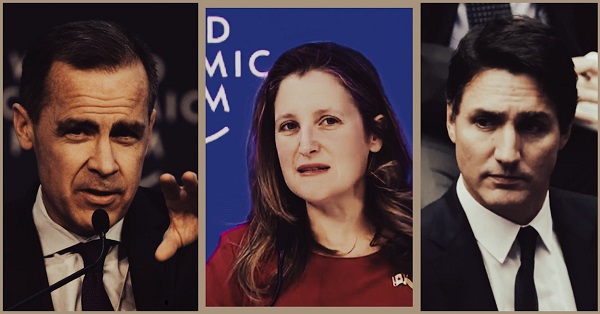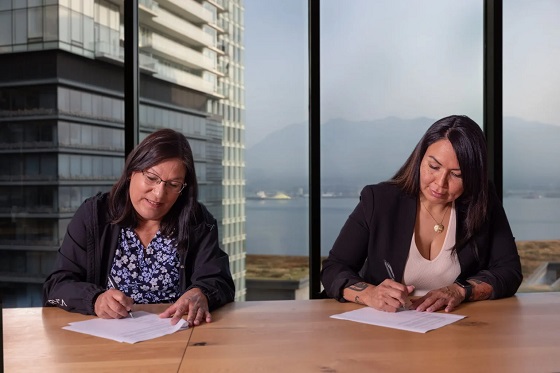Uncategorized
All 6 people trying to replace Trudeau agree with him on almost everything

From LifeSiteNews
The Liberals are choosing a new face, but all six contenders seem likely to continue forcing Canadians down the same path as the PM they’re out to replace
With the Liberal leadership election just over a month away on March 9, Canadians are examining the six final contenders and questioning if they will bring change to the Liberal Party or carry on Prime Minister Justin Trudeau’s radical legacy.
The six contenders for Liberal leader and consequently, the next prime minister, are: Mark Carney, Chrystia Freeland, Karina Gould, Jaime Battiste, Frank Baylis and Ruby Dhalla.
While all the above candidates are promising to turn the Liberal Party around, their policies, both past and proposed, suggest little difference from the radical, anti-life and globalist agenda embraced by the Trudeau government.
Former Governor of the Bank of England Mark Carney
Carney appears to be the frontrunner for Liberal Party leader, with many mainstream outlets tacitly promoting him as a solution for Canadians, and numerous MPs having endorsed his campaign.
However, as LifeSiteNews has previously reported, Carney’s history suggests he would be an even more radical version of Trudeau.
While his impressive work experience certainly raises him in the estimation of Canadians, especially compared with Trudeau’s pre-political career as a drama teacher, the former Governor of the Bank of England, like Trudeau, openly supports abortion, the LGBT agenda and many of the tax and fiscal policies of the Trudeau government, such as the carbon tax.
Carney’s endorsement of energy regulations go even further than Trudeau’s, with the candidate having previously blasted the prime minister for exempting home heating oil from the carbon tax.
Carney has also been a longtime supporter of the globalist World Economic Forum, attending their infamous annual conference in Davos, Switzerland as recently as January 2023.
Carney routinely uses social media to advocate for achieving so-called “net-zero” energy goals, and even had his team bar multiple independent journalists from attending the press conference he held to announce his bid for Liberal leader.
Former Deputy Prime Minister Chrystia Freeland
Freeland’s bid for Liberal leader came as a surprise to many as it closely followed her resignation from Trudeau’s cabinet.
Freeland is perhaps best known internationally for her heavy-handed response to anti-mandate Freedom Convoy protesters, which saw the then-finance minister direct financial institutions to freeze the bank accounts of Canadians who participated in or donated to the protest.
Freeland, like Carney, also has extensive ties to the WEF, with her receiving a personal commendation from former WEF leader Klaus Schwab.
Interestingly, at the same time as Freeland announced her Liberal bid, the WEF’s profile on Freeland was taken down from their website. Additionally, the majority of Freeland’s Instagram posts have been removed from public view.
Many have speculated online as to the reason why these actions were taken, with some suggesting that Freeland desires to distance herself from the massively criticized group.
Critics often pointed to Freeland’s association with the group during her tenure as finance minister and deputy prime minister, as she was known for pushing policies endorsed by the globalist organization, such as the carbon tax and online censorship.
Former House Leader MP Karina Gould
Gould, an avid abortion activist, is perhaps best known for telling American women that they can have their abortions in Canada following the Supreme Court of the United States’ overturning of Roe v. Wade in 2022.
Gould is also known for continually advocating in favor of state-funded media, which critics have warned causes supposedly unbiased news outlets into de facto propaganda arms for the state.
In one example from September, Gould directed mainstream media reporters to “scrutinize” Conservative Party leader Pierre Poilievre, who has repeatedly accused government-funded media as being an arm of the Liberals.
Gould also claimed that Poilievre’s promise to defund outlets like the Canadian Broadcasting Corporation would deny Canadians access to important information, ignoring the fact that the Liberals’ own legislation, which she voted for, blocked all access to news content on Facebook and Instagram.
MP Jaime Battiste
Voting records show that in 2021 Battiste opposed a bill aiming to protect unborn children from sex-selective abortions. Later that same month, he voted to pass Bill C-6, which allows parents to be jailed for up to five years for refusing to deny the biological sex of their gender-confused children.
Furthermore, Battiste struck down a motion to condemn incidents of arson and vandalism of churches across Canada. In October 2023, a Conservative MP put forward a motion to denounce the arson and vandalism of 83 Canadian churches, especially those within Indigenous communities.
However, Battiste moved to adjourn the meeting rather than discuss the motion, saying, “I would like to call to adjourn debate on this if that’s what we can do, so we can hear the rest of the study, but if we have to, then I would rather discuss it in camera because it does have a way of triggering a lot of people who went through residential schools and the things they are going through.”
The Liberal government is known to be extremely lenient in their rhetoric when it comes to attacks on Catholic churches, with Trudeau even saying such behavior was “understandable” even if it is “unacceptable and wrong.”
Former MP Frank Baylis
Baylis served as a Liberal MP in 2015 but chose not to seek re-election in 2019. Now, he has thrown his hat in the ring as Liberal leader.
During his time as MP, Baylis was a staunch supporter of abortion. In 2016, he voted against a Conservative bill to provide protection to unborn children and pregnant mothers from violence.
Interestingly, Baylis is the former owner of the Baylis Medical Company of Montréal which was awarded a $282.5 million government contract for now “useless” ventilators during the COVID “pandemic.”
Former MP Ruby Dhalla
Dhalla served in the House of Commons from 2004 to 2011. Interestingly, Dhalla, born to Indian immigrant parents, has promised to deport illegal immigrants and “clamp down on human traffickers.” Dhalla’s stance sets her apart from the other Liberal candidates on the issue.
While Dhalla styles herself as an “outsider,” during her time as an MP, she worked to further abortion in Canada, voting against legislation to protect babies from violence in the womb.
In conclusion
It seems that no matter who is selected as the next leader of the Liberals, the party will remain one which prides itself on being pro-abortion, pro-LGBT, pro-euthanasia and globalist in vision.
While Trudeau may be taking the blame for the current state of the Liberal Party, with these 6 candidates it would appear that the party remains intent on pushing the same policies.
Although it is true that Trudeau’s political blunders, such as his repeated historical use of black-face or his inviting a Nazi-aligned World War II veteran into Parliament, have contributed to his popularity decline, it seems the policies behind the blunders are not his, but the Liberal Party’s itself.
Uncategorized
New report warns WHO health rules erode Canada’s democracy and Charter rights

The Justice Centre for Constitutional Freedoms has released a new report titled Canada’s Surrender of Sovereignty: New WHO health regulations undermine Canadian democracy and Charter freedoms. Authored by Nigel Hannaford, a veteran journalist and researcher, the report warns that Canada’s acceptance of the World Health Organization’s (WHO) revised International Health Regulations (IHR) represents a serious erosion of national independence and democratic accountability.
The IHR amendments, which took effect on September 19, 2025, authorize the WHO Director-General to declare global “health emergencies” that could require Canada to follow directives from bureaucrats in Geneva, bypassing the House of Commons and the will of Canadian voters.
The WHO regards these regulations as “binding,” despite having no ability or legal authority to impose such regulations. Even so, Canada is opting to accept the regulations as binding.
By accepting the WHO’s revised IHR, the report explains, Canada has relinquished its own control over future health crises and instead has agreed to let the WHO determine when a “pandemic emergency” exists and what Canada must do to respond to it, after which Canada must report back to the WHO.
In fact, under these International Health Regulations, the WHO could demand countries like Canada impose stringent freedom-violating health policies, such as lockdowns, vaccine mandates, or travel restrictions without debate, evidence review, or public accountability, the report explains.
Once the WHO declares a “Pandemic Emergency,” member states are obligated to implement such emergency measures “without delay” for a minimum of three months.
Importantly, following these WHO directives would undermine government accountability as politicians may hide behind international “commitments” to justify their actions as “simply following international rules,” the report warns.
Canada should instead withdraw from the revised IHR, following the example of countries like Germany, Austria, Italy, Czech Republic, and the United States. The report recommends continued international cooperation without surrendering control over domestic health policies.
Constitutional lawyer Allison Pejovic said, “[b]y treating WHO edicts as binding, the federal government has effectively placed Canadian sovereignty on loan to an unelected international body.”
“Such directives, if enforced, would likely violate Canadians’ Charter rights and freedoms,” she added.
Mr. Hannaford agreed, saying, “Canada’s health policies must be made in Canada. No free and democratic nation should outsource its emergency powers to unelected bureaucrats in Geneva.”
The Justice Centre urges Canadians to contact their Members of Parliament and demand they support withdrawing from the revised IHR to restore Canadian sovereignty and reject blind compliance with WHO directives.
Uncategorized
CNN’s Shock Climate Polling Data Reinforces Trump’s Energy Agenda


From the Daily Caller News Foundation
As the Trump administration and Republican-controlled Congress move aggressively to roll back the climate alarm-driven energy policies of the Biden presidency, proponents of climate change theory have ramped up their scare tactics in hopes of shifting public opinion in their favor.
But CNN’s energetic polling analyst, the irrepressible Harry Enten, says those tactics aren’t working. Indeed, Enten points out the climate alarm messaging which has permeated every nook and cranny of American society for at least 25 years now has failed to move the public opinion needle even a smidgen since 2000.
Appearing on the cable channel’s “CNN News Central” program with host John Berman Thursday, Enten cited polling data showing that just 40% of U.S. citizens are “afraid” of climate change. That is the same percentage who gave a similar answer in 2000.
Dear Readers:
As a nonprofit, we are dependent on the generosity of our readers.
Please consider making a small donation of any amount here.
Thank you!
Enten’s own report is an example of this fealty. Saying the findings “kind of boggles the mind,” Enten emphasized the fact that, despite all the media hysteria that takes place in the wake of any weather disaster or wildfire, an even lower percentage of Americans are concerned such events might impact them personally.
“In 2006, it was 38%,” Enten says of the percentage who are even “sometimes worried” about being hit by a natural disaster, and adds, “Look at where we are now in 2025. It’s 32%, 38% to 32%. The number’s actually gone down.”
In terms of all adults who worry that a major disaster might hit their own hometown, Enten notes that just 17% admit to such a concern. Even among Democrats, whose party has been the major proponent of climate alarm theory in the U.S., the percentage is a paltry 27%.
While Enten and Berman both appear to be shocked by these findings, they really aren’t surprising. Enten himself notes that climate concerns have never been a driving issue in electoral politics in his conclusion, when Berman points out, “People might think it’s an issue, but clearly not a driving issue when people go to the polls.”
“That’s exactly right,” Enten says, adding, “They may worry about in the abstract, but when it comes to their own lives, they don’t worry.”
This reality of public opinion is a major reason why President Donald Trump and his key cabinet officials have felt free to mount their aggressive push to end any remaining notion that a government-subsidized ‘energy transition’ from oil, gas, and coal to renewables and electric vehicles is happening in the U.S. It is also a big reason why congressional Republicans included language in the One Big Beautiful Bill Act to phase out subsidies for those alternative energy technologies.
It is key to understand that the administration’s reprioritization of energy and climate policies goes well beyond just rolling back the Biden policies. EPA Administrator Lee Zeldin is working on plans to revoke the 2010 endangerment finding related to greenhouse gases which served as the foundation for most of the Obama climate agenda as well.
If that plan can survive the inevitable court challenges, then Trump’s ambitions will only accelerate. Last year’s elimination of the Chevron Deference by the Supreme Court increases the chances of that happening. Ultimately, by the end of 2028, it will be almost as if the Obama and Biden presidencies never happened.
The reality here is that, with such a low percentage of voters expressing concerns about any of this, Trump and congressional Republicans will pay little or no political price for moving in this direction. Thus, unless the polls change radically, the policy direction will remain the same.
David Blackmon is an energy writer and consultant based in Texas. He spent 40 years in the oil and gas business, where he specialized in public policy and communications.
-

 Business19 hours ago
Business19 hours agoCBC cashes in on Carney as the news industry playing field tilts further in its favour, crippling the competition
-

 Energy2 days ago
Energy2 days agoThawing the freeze on oil and gas development in Treaty 8 territory
-

 Business2 days ago
Business2 days agoWhat Pelosi “earned” after 37 years in power will shock you
-

 Agriculture10 hours ago
Agriculture10 hours agoFarmers Take The Hit While Biofuel Companies Cash In
-

 Business2 days ago
Business2 days agoOttawa should stop using misleading debt measure to justify deficits
-

 Agriculture19 hours ago
Agriculture19 hours agoThe Canadian Food Inspection Agency’s Bloodlust for Ostriches: Part 2
-

 International2 days ago
International2 days agoBBC uses ‘neutrality’ excuse to rebuke newscaster who objected to gender ideology
-

 International2 days ago
International2 days agoLarge US naval presence in Caribbean reveals increased interest in western security


